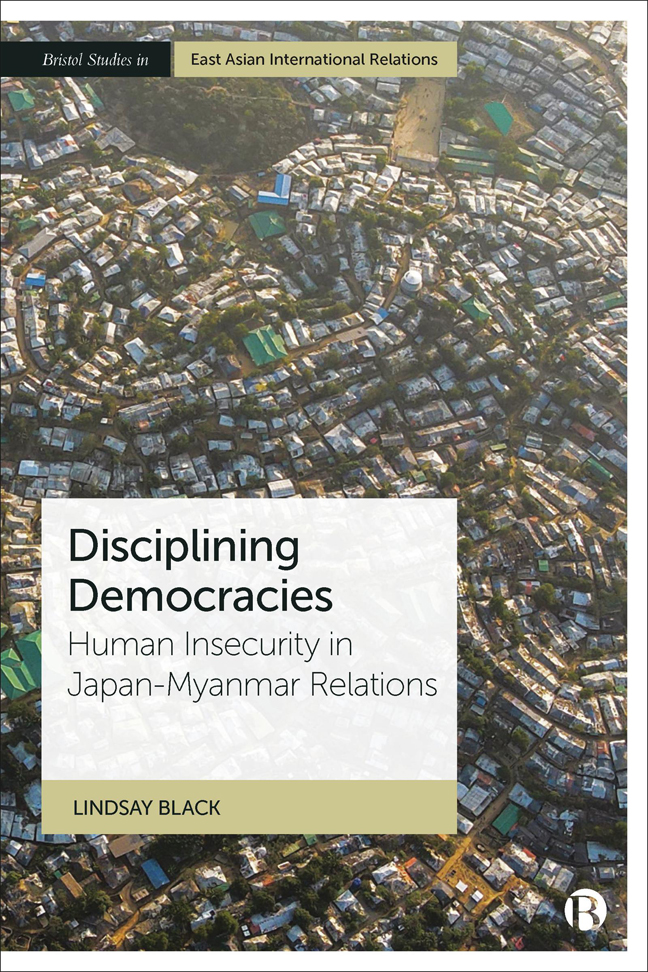Book contents
- Frontmatter
- Dedication
- Contents
- List of Abbreviations
- Acknowledgements
- Introduction
- 1 The Evolution of New Area Studies
- 2 ‘Asia's Liberal Leader’ and Human Insecurity
- 3 Japan as a ‘Bridge’: Facilitating Myanmar's Transition to a ‘Disciplined Democracy’
- 4 Japan and Special Economic Zones in Myanmar
- 5 Meddling for Profit: Japan's Peace-building Role in Myanmar
- 6 Dereliction of Responsibility: Japan's ‘Liberal Leadership’ in the 2016–20 Rakhine Crisis
- Conclusion: The Chimera of Progress
- Notes
- References
- Index
Conclusion: The Chimera of Progress
Published online by Cambridge University Press: 25 January 2024
- Frontmatter
- Dedication
- Contents
- List of Abbreviations
- Acknowledgements
- Introduction
- 1 The Evolution of New Area Studies
- 2 ‘Asia's Liberal Leader’ and Human Insecurity
- 3 Japan as a ‘Bridge’: Facilitating Myanmar's Transition to a ‘Disciplined Democracy’
- 4 Japan and Special Economic Zones in Myanmar
- 5 Meddling for Profit: Japan's Peace-building Role in Myanmar
- 6 Dereliction of Responsibility: Japan's ‘Liberal Leadership’ in the 2016–20 Rakhine Crisis
- Conclusion: The Chimera of Progress
- Notes
- References
- Index
Summary
Introduction
On 1 February 2021, the Tatmadaw, under the command of Senior General Min Aung Hlaing, overthrew the democratically elected government of Aung San Suu Kyi in a coup. A little over ten years since Myanmar began its transition to a ‘disciplined democracy’, the country was once again under authoritarian military control. Though the actions of Myanmar's military and government in Rakhine state had already returned the country to pariah status within the international community, as Chapter 6 demonstrated, the coup cemented this status, reversing the progress towards building a democracy that had been made. The hopes of the people of Myanmar for a potentially brighter and more prosperous future were dashed.
For Japan, the coup came as a shock. Since 2011, Japanese policy makers had actively sought to open Myanmar's economy through development aid and investment. Myanmar's geographical position made it the end point for the East–West and Southern Economic Corridors that would traverse the Mekong region, linking the Indian Ocean with the South China Sea. This economic connectivity would improve access for Japanese production networks to regional and global markets. From an ideological standpoint, Japan's ability to guide Myanmar's successful democratization and rehabilitation into the international community would bolster its status as ‘Asia's liberal leader’ and counter the notion that Japan was in decline. A Myanmar experiencing its own ‘Meiji revolution’ would provide rhetorical support for a reinvigorated Japan; a Japan that was truly ‘back’. Myanmar's closer alignment with Japan could counter Chinese ambitions in a scramble for ‘Asia's last frontier’, helping to fulfil Japanese regional visions of a FOIP.
This concluding chapter opens by outlining how the coup unfolded and the international community's response. The chapter then details Japan's response to the coup, which was initially uncertain, as policy makers sought to assess how developments would unfold. On the one hand, the Japanese government joined with the international community in condemning the coup and urging a return to democracy. New developmental assistance projects were paused and Japanese businesses temporarily halted operations in Myanmar.
- Type
- Chapter
- Information
- Disciplining DemocraciesHuman Insecurity in Japan-Myanmar Relations, pp. 153 - 175Publisher: Bristol University PressPrint publication year: 2023



